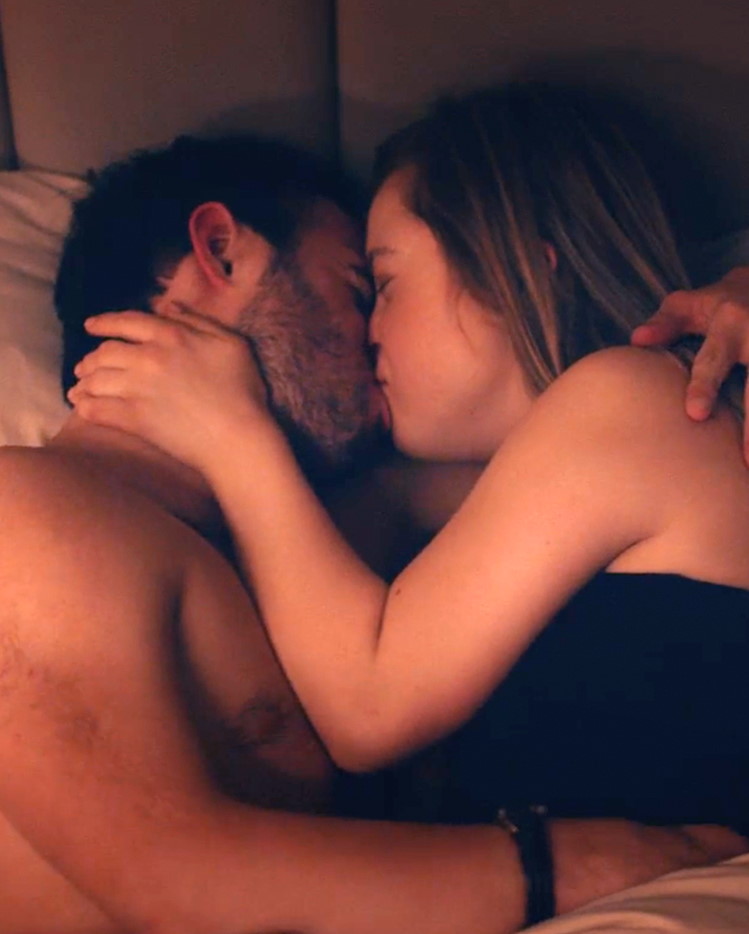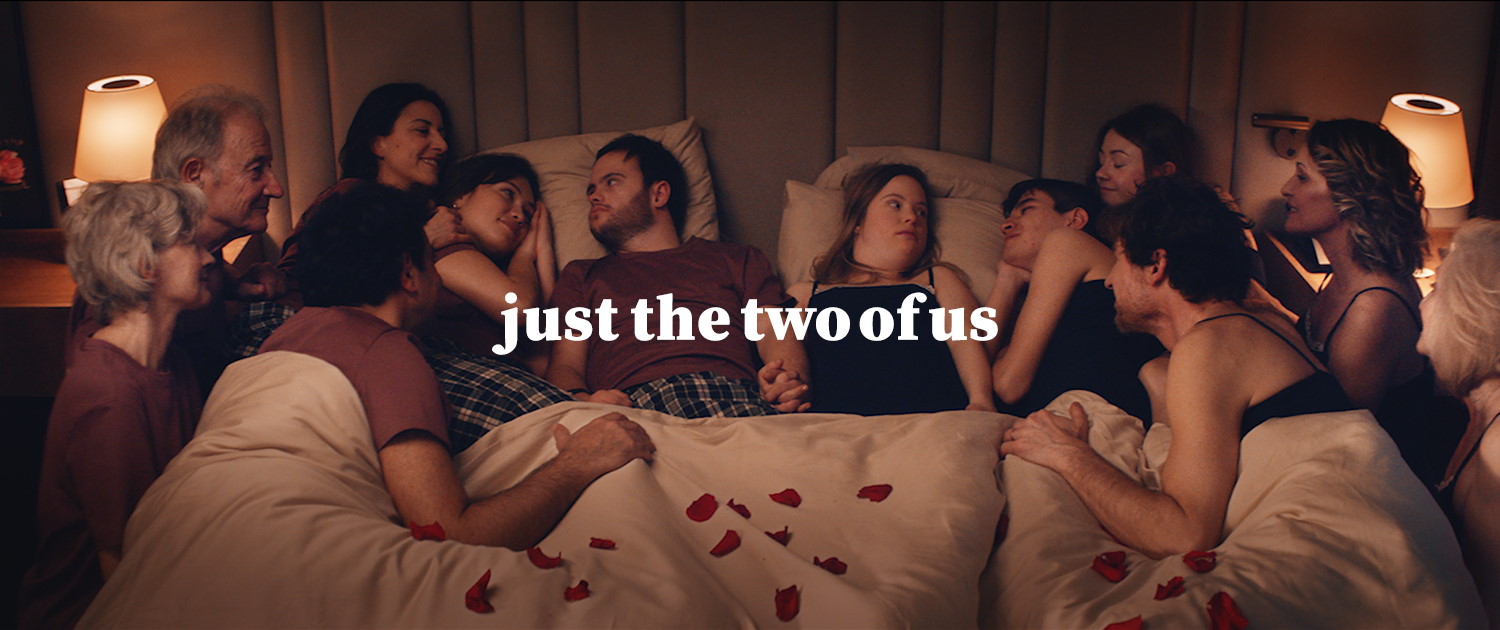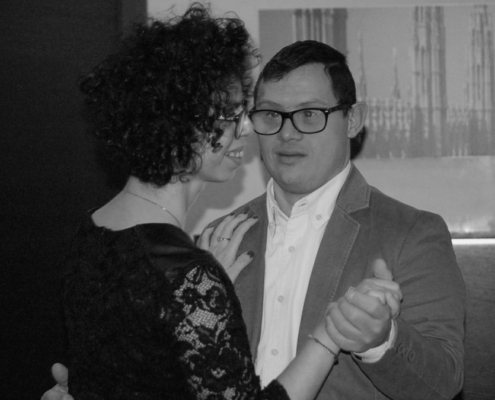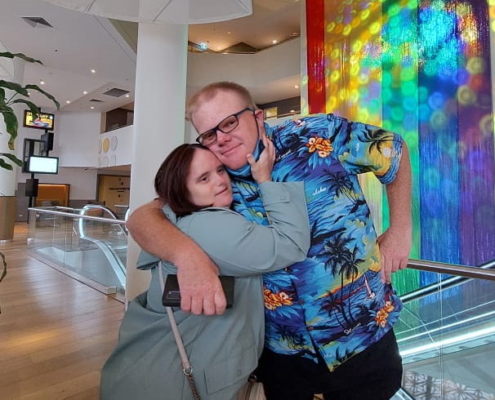Love needs space.
Everyone has a right to enjoy romantic and sexual relationships, but for people with Down syndrome and intellectual disabilities, these basic rights are too often considered taboo. People with Down syndrome are often infantilised and perceived as “forever children”, and in many ways shielded from the experiences of adulthood, including sexuality. Over the last few decades, many stereotypes surrounding disability have been challenged and shattered. It is now time to break down the last one still standing.
Big Questions and Short Answers on Sex,
Down Syndrome and Sexuality
What is a romantic relationship?

There are a lot of different kinds of relationships: family, friends, professional and romantic relationships.
A romantic relationship is a special relationship with someone you are attracted to. You might want to hug or kiss them, or touch their bodies, or have sex. This can be exciting, and sometimes a little bit confusing.
You are in a romantic relationship when BOTH people in the relationship say “yes” to being in the relationship. You are not in a romantic relationship because you are attracted to someone.
Sometimes romantic relationships might also become sexual relationships, but this can only happen when both partners say “yes” and agree.
Can people with Down syndrome have sex or be sexually attracted to others?
Do people with Down syndrome have the same physical development as their peers?
When can we start talking about relationships and sexuality?
Can people with Down syndrome have a sexual relationship?

Yes. People with Down syndrome can have sexual relationships. As for all of us, the decision to have a sexual relationship must be made freely, without pressures and within a relationship among equals and respectful of each other’s needs and rhythms. A fulfilling and healthy sexual life requires clear and accessible information on how our body works, how to recognize our feelings and those of our partner, as well as on contraception
Is there special contraception for people with Down syndrome?
Can people with Down syndrome get pregnant?
Do people with Down syndrome masturbate?
By discussing sexuality with a person with Down Syndrome do we run the risk of eliciting an inappropriate sexual behavior?

No. Appropriate and comprehensive relationships and sex education can help a young person with Down syndrome to pursue fulfilling, safe, healthy and respectful relationships, and to participate fully in society and their community. It is crucial to ensure that people with Down syndrome have access to education about social conventions, to respect privacy, assess situations and learn to say no and understand the concept of consent.
An appropriate, positive and comprehensive sexual education helps preventing unwanted pregnancies, sexually transmissible infections, and helps young people to recognize potential situations of abuse.
Can people with Down syndrome be attracted to people of the same gender?
Can a person with Down syndrome have a romantic/sexual relationship with a person without Down syndrome?
Does it make sense for a young woman with Down syndrome to go to a gynecologist even though she is not sexually active?
What is consent?
Consent must be given only when you really want to do something, and not when you feel that you have to because someone else wants it, because you are afraid of hurting the other person’s feelings or because you do not want the other person to get angry.
What is abuse?
Is sexuality just having sexual intercourse?

Sexuality is more than just penetration alone; sexuality is a set of gestures, attitudes, emotions, feelings that each of us expresses in their own way, but that can be important for our individual wellbeing. To have fulfilling romantic relationships, it is important to support the emotional and sexual development of every individual.
Learn Everything You Can About Sex,
Down Syndrome and Sexuality
Here are some additional resources for you and for your loved one with Down syndrome to learn more about sex, sexuality, protection and more.
Edited by Meriah Nichols
Toolkit
Online Virtual Course on Sexuality Education
Talking with Your Kids: Sexuality and Developmental Disabilities Katherine McLaughlin, 2017
All courses from Elevatus are linked here: www.elevatustraining.com
Books
Teaching Children with Down Syndrome about Their Bodies, Boundaries, and Sexuality; Terri Couwenhoven. Woodbine House, 2007
The Boy’s Guide to Growing Up: Choices and Changes During Puberty; Terri Couwenhoven. Woodbine House, 2012
The Girl’s Guide to Growing up: Choices and Changes During the Tween Years; Terri Couwenhoven. Woodbine House, 2012
Boyfriends and Girlfriends: A Guide to Dating for People with Disabilities; Terri Couwenhoven. Woodbine House, 2015
I Openers: Parents Ask Questions About Sexuality and Children with Developmental Disabilities; Dave Hingsburger. Family Support Institute Press., 1993
Sexuality: Your Sons and Daughters with Intellectual Disabilities; Karen Melberg Schwier and David Hingsburger
Just Say Know: Understanding and Reducing the Risk of Sexual Victimization of People with Developmental Disabilities; Dave Hingsburger. Diverse City Press, Inc., 1995
It’s So Amazing; Robie Harris, Candlewick Press, 1999
It’s Perfectly Normal; Robie Harris, Candlewick Press, 1994
Changing Bodies, Changing Lives; Ruth Bell, Three Rivers Press, 1998
#JustTheTwoOfUs
Stories from around the world
sponsored by
In partnership with

Under the patronage of

PRIVACY POLICY DI COORDOWN.IT | TITOLARE DEL TRATTAMENTO DEI DATI: COORDOWN ODV – VIA A. VOLTA, 19/4 – GENOVA | PRIVACY@COORDOWN.IT









